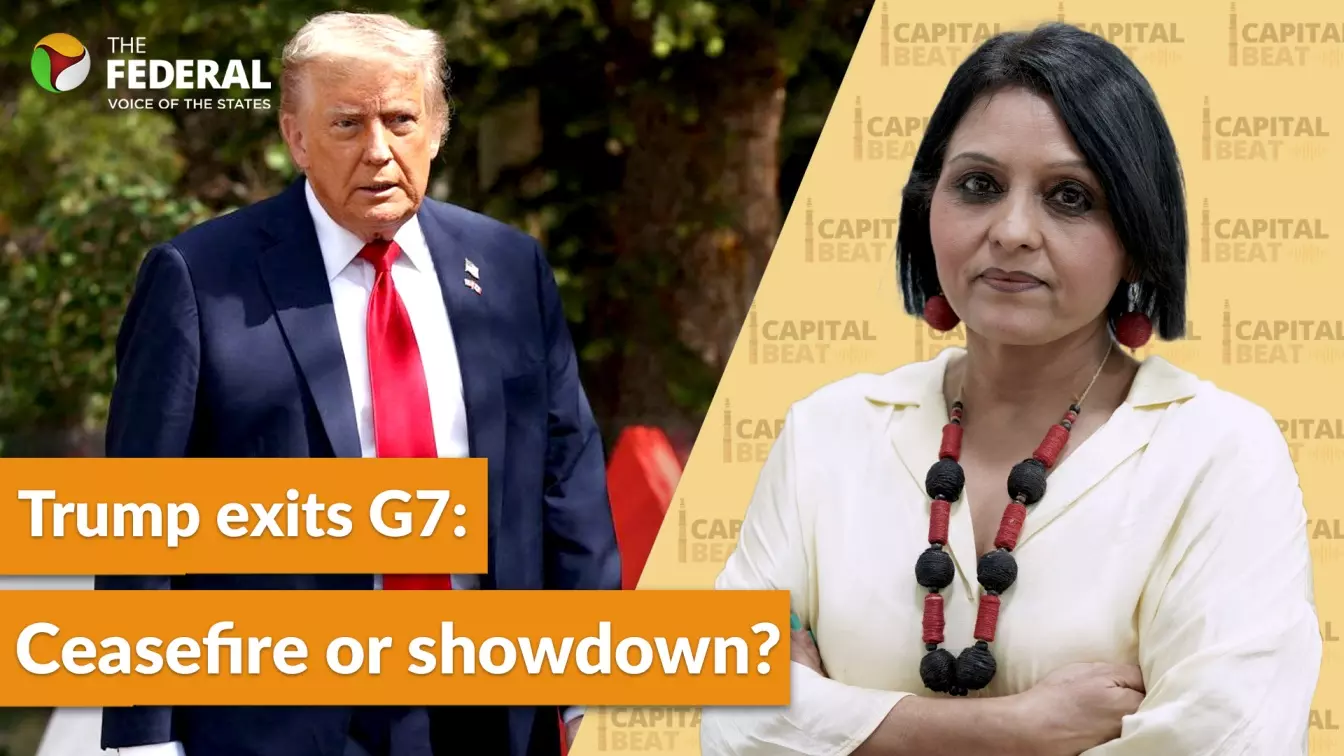
Donald Trump at G7
Iran-Israel conflict: Decoding Trump's game plan and India's stance? I Discussion
Trump leaves G7 abruptly over Middle East tensions. Is the US pushing Iran towards surrender—or heading into war?

In this episode of Capital Beat, panelists Ambassador Meera Shankar, Prof. Swaran Singh, Sanjay Kapoor, and Pushpraj Deshpande discuss the geopolitical storm sparked by US President Donald Trump’s abrupt exit from the G7 Summit. With escalating tension between Israel and Iran, the panel decodes the implications of Trump’s rhetoric, potential US involvement, and India’s diplomatic position in a shifting global order.
Trump’s shock exit and mixed signals
President Trump’s sudden departure from the G7 Summit citing “what’s going on in the Middle East” has raised alarm globally. French President Emmanuel Macron suggested Trump was attempting to mediate a ceasefire between Israel and Iran. However, Trump lashed out on Truth Social, accusing Macron of chasing publicity and warning of something “bigger” coming—sparking fears of direct US involvement.
Ambassador Meera Shankar noted, “Trump is no longer focused on brokering peace. He seems to be backing Israel’s aggressive approach and may be ready to transfer bunker buster bombs to strike Iran’s nuclear facilities.” Shankar highlighted internal contradictions in US politics, where MAGA loyalists oppose war, while hawkish Republicans push for escalation.
Conflicting domestic pressures
Prof. Swaran Singh argued that Trump is caught between his anti-war image and mounting pressure from Israeli allies. “He left G7 abruptly and summoned his national security team mid-flight. But he’s unlikely to put boots on the ground. Instead, we might see increased force posturing and intelligence-sharing with Israel.”
Singh emphasized Trump’s strategic use of sanctions and military aid over direct engagement. He noted the danger in legitimizing preventive war and highlighted the global concern over a broader regional fallout.
Propaganda or real war?
Sanjay Kapoor cautioned against trusting media leaks about US military orders, particularly from Israeli outlets. “A lot of these announcements are to satisfy Netanyahu, who is exerting disproportionate influence on Trump. What Trump sells is not war, but the illusion of controlling conflict without escalation.”
Kapoor added that Trump’s populist image as a peace-broker is at risk. “His voter base—who backed him for ending wars—is watching closely. This is a dangerous political gamble.”
Iran’s resilience and the regime change agenda
Pushpraj Deshpande contextualized Israel’s tactics as part of a long-standing regime change strategy. “From assassinations to baiting the US, Israel has sought to destabilize Iran. But Iran, while under stress, has shown surprising resilience.”
He warned that if the US supports Israel’s aggression without clear evidence of nuclear threats, it could repeat the disastrous path of Iraq in 2003. “This time, the collateral damage could disrupt global oil supply, shipping, and even India’s strategic interests.”
A dangerous precedent for diplomacy
Deshpande also critiqued India’s diplomatic posture. “India’s neutrality has become complicity. By tacitly endorsing Israel’s actions, we weaken our stand on issues like Pakistan-occupied Kashmir and China’s aggression.”
Ambassador Meera Shankar backed this view, stressing the erosion of global norms. “Assassination, once condemned, is now being re-legitimized as state policy. That’s a massive backward step.”
Military limits and global fallout
Prof. Singh underscored that US military intervention has rarely yielded long-term success. “Wherever the US has intervened in the last 90 years, the region has only seen chaos. Trump may escalate support but can’t guarantee control over Netanyahu.”
Singh said the G7 was an opportunity for diplomacy, but it was overshadowed by America’s one-sided stance. “Even the language used in joint statements is skewed. It undermines trust in US mediation and risks pushing the world deeper into conflict zones.”
India’s missteps in a multipolar world
Deshpande warned that India’s foreign policy under the Modi government risks alienation. “We’ve surrendered autonomy to US interests—from dropping BRICS currency ideas to backing Israel blindly. This compromises our national interest and global standing.”
He concluded that the Congress and India parties must raise these issues in Parliament and propose a coherent alternative foreign policy. “We’ve moved from being seen as a democratic counterweight to China to being lumped with failing states. That’s unacceptable.”
The content above has been generated using a fine-tuned AI model. To ensure accuracy, quality, and editorial integrity, we employ a Human-In-The-Loop (HITL) process. While AI assists in creating the initial draft, our experienced editorial team carefully reviews, edits, and refines the content before publication. At The Federal, we combine the efficiency of AI with the expertise of human editors to deliver reliable and insightful journalism.

